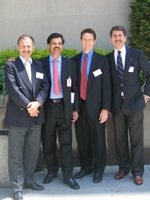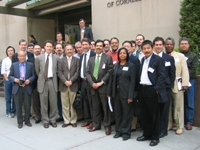The course, which included both lectures and laboratory sessions, drew 53 attendees from across the country, Puerto Rico, and Chile to discuss and observe the new techniques in endonasal endoscopic skull base surgery developed at Weill Cornell by Dr. Theodore Schwartz, associate professor in the Department of Neurological Surgery, and Dr. Vijay Anand, clinical professor of otorlaryngology.

Dr. Aldo Stamm, Dr. Vijay Anand, Dr. Theodore Schwartz, and Dr. Paolo Cappabianca at the conference for Endoscopic Skull Base Surgery. Dr. Stamm and Dr. Cappabianca brought their endoscopic surgery expertise from Brazil and Italy, respectively, to complement Dr. Anand and Dr. Schwartz's advances at Weill Cornell.
In addition to Drs. Schwartz and Anand, who directed the course, lecturing faculty included Dr. Y. Pierre Gobin, professor of radiology and radiology in neurosurgery; Dr. Daniela Milani, instructor of medicine; Dr. Mark Souweidane, vice chairman and associate professor of clinical neurological surgery; Dr. Philip Steig, professor and chairman of neurological surgery; and Dr. Robert Zimmerman, professor and vice chairman of radiology.
An endoscope is a camera mounted on a flexible tube. In skull base surgery, the endoscope is inserted into the nostril to provide strikingly clear illumination and visualization of the brain.
This approach to treating pituitary tumors, cerebrospinal fluid leaks, and meningiomas, among other anterior skull base pathologies, has gained increasing attention in recent months, in the medical community and the media. Patients benefit from improved visualization during surgery, a faster recovery time and shorter hospital stays.
"It is imperative that physicians become familiar with these new approaches and advances in order to provide the highest possible level of patient care," said Dr. Schwartz.
Two visiting professors were invited: Dr. Paolo Cappabianca, professor of neurosurgery from the Universita Degli Studi de Napoli Federico II in Naples, Italy, and Dr. Aldo Stamm, director of the Sao Paulo ENT Center in Sao Paulo, Brazil. Emerging from their meeting at the conference, the four have agreed to collaborate on research of sphenoid sinus encephalitis.
Photos courtesy of the Department of Neurological Surgery.


